Add this eBook to your basket to receive access to all 333 records. Our indexes include entries for the spelling payn. In the period you have requested, we have the following 333 records (displaying 111 to 120): These sample scans are from the original record. You will get scans of the full pages or articles where the surname you searched for has been found. Your web browser may prevent the sample windows from opening; in this case please change your browser settings to allow pop-up windows from this site. Shaftesbury Abbey Court Roll
(1454)
The roll (Shaftesbury Borough Archives B 6) of the courts of the fees of the barony of Shaftesbury (held by the Abbey of Shaftesbury) for the 32nd year of the reign of king Henry VI, of four membranes, contains the record of the 17 three-weekly courts from 17 October 1453 to 18 September 1454. The jurisdiction of the court included the bailiwicks of Bradford and Tisbury in Wiltshire, and Hanleigh and Kingston (Purbeck) in Dorset. The text from 17 October 1453 to 20 February 1454 was edited and published by Charles Herbert Mayo in 1890 to 1891. This is the court roll for 30 January 1454. | Sample scan, click to enlarge

| The English in France
(1456)
King Henry VI of England (one of the grandsons of Charles VI of France) claimed the throne of France (and quartered the fleurs-de-lis of France with the lions of England on the royal standard) as had his predecessors since Edward III, as descendants of Philip IV of France. The English had real power or influence in Brittany, Normandy, Flanders and Gascony, and actual possession of several coastal garrisons, in particular Calais, where the French inhabitants had been replaced by English. Henry VI came to the throne only seven years after his father had trounced the French at Agincourt; but his cousin, Charles VII, who became king of France in the same year, spent his long reign rebutting the English king's claim to his throne by territorial reconquest and consolidation. The English administration kept a series of records called the French Rolls. On these are recorded royal appointments and commissions in France; letters of protection and safe-conduct to soldiers, merchants, diplomats and pilgrims travelling to France from England and returning, and to foreign legations. There are also licences to merchants to export to the Continent, and to captains to transport pilgrims. As Henry VI's reign progressed, and the English grip on northern France loosened, the French Rolls also increasingly include entries concerning the ransoming of English prisoners. | Sample scan, click to enlarge
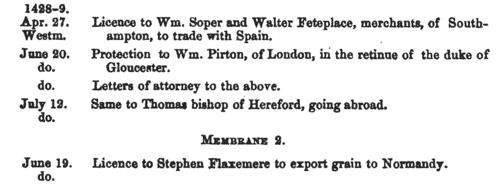
| Inhabitants of Colchester (1451-1457)
Inhabitants of Colchester, Essex, swearing fealty to the Crown, as recorded in the Red Paper Book.
| Sample scan, click to enlarge
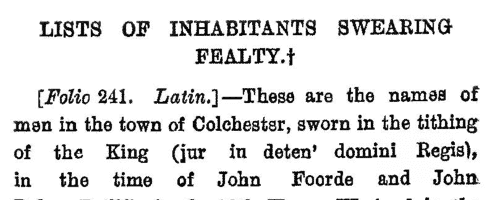
| Ablemen of Norwich
(1457)
The Old Free Book of the city of Norwich includes this muster roll of about 1457. Able-bodied men are listed subleet by subleet, with a note of the armour furnished or sum of money raised towards buying armour. About 600 persons are assessed, 80 of whom assessed for money only appear to be additions to the original list. A total of 480 jacks were assigned: a 'jack' being a jacket similar to a gambeson or doublet. | Sample scan, click to enlarge

| 'Foreigners' in Colchester (1458)
'Foreigners', i.e. non-burgesses, living in Colchester, Essex, swearing fealty to the Crown, as recorded in the Red Paper Book.
| Sample scan, click to enlarge
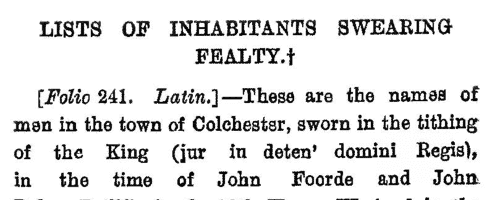
| The English in France
(1458)
King Henry VI of England (one of the grandsons of Charles VI of France) claimed the throne of France (and quartered the fleurs-de-lis of France with the lions of England on the royal standard) as had his predecessors since Edward III, as descendants of Philip IV of France. The English had real power or influence in Brittany, Normandy, Flanders and Gascony, and actual possession of several coastal garrisons, in particular Calais, where the French inhabitants had been replaced by English. Henry VI came to the throne only seven years after his father had trounced the French at Agincourt; but his cousin, Charles VII, who became king of France in the same year, spent his long reign rebutting the English king's claim to his throne by territorial reconquest and consolidation. The English administration kept a series of records called the French Rolls. On these are recorded royal appointments and commissions in France; letters of protection and safe-conduct to soldiers, merchants, diplomats and pilgrims travelling to France from England and returning, and to foreign legations. There are also licences to merchants to export to the Continent, and to captains to transport pilgrims. As Henry VI's reign progressed, and the English grip on northern France loosened, the French Rolls also increasingly include entries concerning the ransoming of English prisoners. | Sample scan, click to enlarge
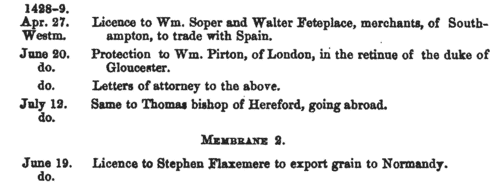
| Inhabitants of Colchester (1461-1463)
Inhabitants of Colchester, Essex, swearing fealty to the Crown, as recorded in the Red Paper Book.
| Sample scan, click to enlarge
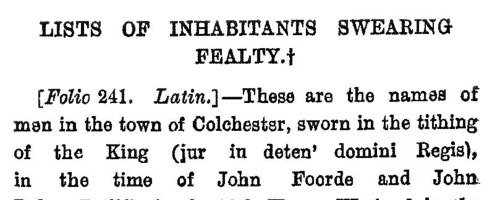
| Dublin diocese testators and legatees
(1457-1483)
This register of testaments or wills and inventories from the diocese of Dublin in the time of archbishops Tregury and Walton (now in the Library of Trinity College, Dublin) was printed with a translation by the Royal Society of Antiquaries of Ireland in 1896-7. The inventory usually comes first, and often includes names of debtors and creditors to the testator. The diocese of Dublin did not extend far into the Pale; but the province of Dublin, over which the archbishops had prerogative probate jurisdiction, included the southern half of Ireland, but virtually all these wills are from the city of Dublin or close at hand. | Sample scan, click to enlarge
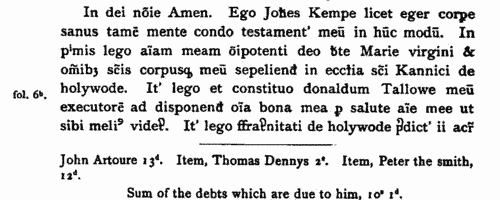
| Somerset Feet of Fines
(1400-1484)
Pedes Finium - law suits, or pretended suits, putting on record the ownership of land in Somerset. These abstracts were prepared by Emanuel Green for the Somerset Record Society and published in 1906. They cover material for the county from the reigns of Henry IV, Henry V, Henry VI, Edward IV and Richard III. | Sample scan, click to enlarge
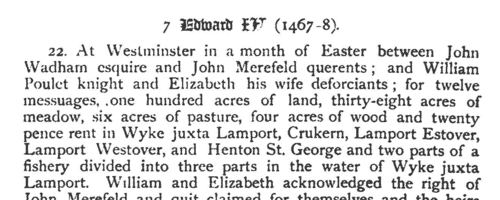
| London and Middlesex Feet of Fines
(1198-1485)
Pedes Finium - law suits, or pretended suits, putting on record the ownership of land in London and Middlesex. | Sample scan, click to enlarge

|
Research your ancestry, family history, genealogy and one-name study by direct access to original records and archives indexed by surname.
|











